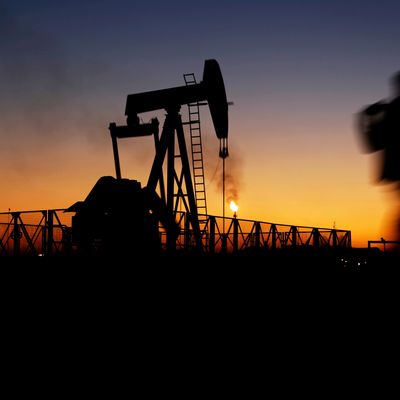
The past few years have vindicated many long-ignored prophecies of impending catastrophe (from the political to climatic to epidemiological). But “peak oil” isn’t one of them.
Far from running out of that growth-fueling, climate-destroying black gold, humanity has more crude on its hands than it knows what to do with. The world-historic scale of the global crude glut first made its presence felt last Monday, when oil futures turned negative.
The cause of this counterintuitive phenomenon is fairly simple, but requires some unpacking. While ordinary people buy oil for energy, some investors buy it as a portfolio-diversification mechanism. If you believe that demand for oil is likely to be higher in the future than it is today, you can buy a contract to purchase oil at whatever price it’s trading for on some fixed date next month. Of course, most investors do not want to personally purchase actual drums of oil. They merely want to own oil as a financial abstraction. Furthermore, betting on the price movement of any commodity over a one-month time frame is a risky business. Most oil investors, like most equity investors, are looking to make long-term bets. They want to bet that oil prices will be higher at some point in the future, not necessarily next month. For these two reasons, oil investors tend to roll over their futures contracts: As the expiration (i.e., lock-in) date on a May oil contract approaches, they sell their claims and purchase new oil contracts for June.
Which works fine, as long as there are enough people in the world who would like to buy actual (smelly, greasy, heavy, flammable) oil from speculators at any given moment in time. If a global pandemic were to turn billions of humans into homebodies all at once, however, oil speculators could find themselves invested in what are, essentially, “storage headache futures.” Thus, when the expiration date for May oil contracts arrived last week, the value that investors placed on not having a bunch of oil drums delivered to their apartments outstripped the value actual oil users placed on owning more oil in mid-May. Which is to say: Speculators found themselves bidding for the opportunity to give away their oil, and the price on a May oil contract turned negative.
The United States Oil Fund (USO), the world’s largest oil-backed exchange trading fund, does not want to find itself in that position. Thus, on Monday, the USO announced that it would sell off all its contracts for the delivery of oil in June, and shift its capital into longer-term oil contracts — a move that sent the price of oil crashing down to roughly $11 a barrel.
This is a troublesome state of affairs for oil traders. For nations with oil-centric economies, it is something much worse.
International oil producers were already struggling to fend off overproduction before the COVID-19 crisis began. America’s shale revolution had dealt a blow to both the market share and pricing power of major oil producers. Saudi Arabia, which can produce oil fairly cheaply and has a $500 billion sovereign wealth fund to lean on, has some incentive to sell its crude at a massive discount, in order to ruin its more vulnerable competitors and inherit their market share. Although less fiscally secure than Riyadh, Russia also has some cause for pressing its advantage over the world’s small oil producers through overproduction. Of course, if all producers start clawing for market share by flooding the world with below-cost oil, then everyone loses. Nevertheless, keeping a lid on such price wars can be difficult, especially when the specter of an eventual green-energy transition gives all players reason to fear that the time to capitalize on their reserves is running thin.
So there was plenty of kindling for a global overproduction crisis, and then the novel coronavirus doused that kindling in gasoline and dropped 5,000 hellfire missiles on the petrol-soaked logs.
The onset of the pandemic triggered a price war between Russia and Saudi Arabia. The collapse in global demand alone would have been sufficient to produce a giant oil glut. With Moscow and Riyadh clawing for advantage — and each seeking to drive America’s high-cost frackers into the dirt — that glut has grown comically large. Across the globe, producers are struggling to find storage for their unsold oil, since the price that oceangoing tankers charge for holding such wares has soared. As each nation started running up against its own storage capacities, the Russians and Saudis did strike a deal over production cuts earlier this month. But even if they abided by such measures, there is, in the words of the International Energy Agency, “no feasible agreement that could cut supply by enough to offset such near-term demand losses.”
For the citizens of many oil-producing states, these “near-term demand losses” mean cuts in social services and public employment in the midst of a pandemic-induced depression. For already embattled regimes in in Iraq, Iran, and Venezuela, the coming fiscal and economic crises pose an existential risk. As the Associated Press reports:
The historic crash in oil prices in the wake of the coronavirus pandemic is reverberating across the Middle East as crude-dependent countries scramble to offset losses from a key source of state revenue — and all this at a time when several of them already face explosive social unrest.
… Iraq saw massive protests in the past months by a populace angry over the weak economy and rampant corruption — and the turmoil could erupt again. Cutbacks in spending will only add to the pain for a population struggling to get by under coronavirus restrictions … In its draft 2020 budget, Iraq had been counting on revenues from oil prices at $56 a barrel to fund badly needed development projects and the bloated public sector, costing nearly $45 billion in compensation and pensions. Oil Minister Thamir Ghadhban said recently that revenue from crude exports has dropped by 50%.
The oil shock has proven nearly as devastating to some of the developing world’s erstwhile success stories. As the Energy Industry Review writes of conditions in Nigeria:
Back in Africa, prices put the brakes on continent’s fastest-growing economy. With oil making up roughly 9% of GDP, Nigeria has a break-even oil price of USD 57 according to independent analysis from the oil and gas research team at Acuity Knowledge Partners. Oil is more than essential for governmental funding and it represents up to 90% of total exports. The IMF expects Nigeria’s economy to shrink significantly due to the crisis with the country keeping in storage up to 50 million barrels of unsold crude oil by May. Unemployment will reportedly rise by approximately 25%, even if more than 20 million people were already unemployed. Additionally, even if the country has some small savings (reportedly up to 2 billion US dollars), it will not be enough as a retainer to the spiral foreseen.
Unlike the U.S., Nigeria and Iraq cannot borrow money at near-zero interest rates, nor print the world’s reserve currency. They do not have the fiscal or institutional capacities to guarantee workers’ lost wages, as the United Kingdom and Denmark have attempted to do. COVID-19’s economic consequences, by themselves, will produce humanitarian crises throughout the developed world.
If large-scale outbreaks of the virus arrive in economically devastated petro-states with underdeveloped health-care systems and overcrowded slums, those humanitarian crises could attain a historic and horrifying scale. Regardless, hundreds of millions of already-poor people are about to suffer giant losses in material well-being. That is all-but certain to rattle fragile governments throughout the developing world. Should any of those states collapse, well-heeled investors in the West will once again be forced to grapple with the unwieldy real-world underpinnings of their speculative abstractions.






























